Originally from Devon, English singer-songwriter John Smith got his start playing bars and clubs in Liverpool, both with his own songs and as a side player for artists like Lianne La Havas, Lisa Hannigan, and David Gray. Growing up with folk music and guitar music influences from Eric Clapton to Maria Callas to Nick Drake, John’s sensitivity as a player is one of the cornerstones of his music, especially when it comes to his live music. It’s earned him a passionate fanbase ever since his first EP release in 2009.
Host Lizzie No got to witness the connection he shares with audiences on a recent month-long tour around the UK. Everywhere they went together, audience members had stories of how important John’s songs were to them and guitar nerds flocked to have a look at his pedal board.
LISTEN: APPLE • SPOTIFY • AMAZON • MP3
Beyond his musicianship, John’s music is imbued with an earnestness that invites listeners to look around and feel gratitude: for nature (especially the vistas of rural England), for the wisdom that memory can provide, and for the people close to us. His latest album, The Living Kind, is a meditation on how delicate love and life can be, but also how enduring. It also showcases the creative partnership between Smith and his longtime friend and roots music industry icon, Joe Henry. One of the album’s highlights is “Milestones,” in which John reflects on how parenthood has changed his perspective on the artist’s life.
Photo Credit: Phil Fisk


